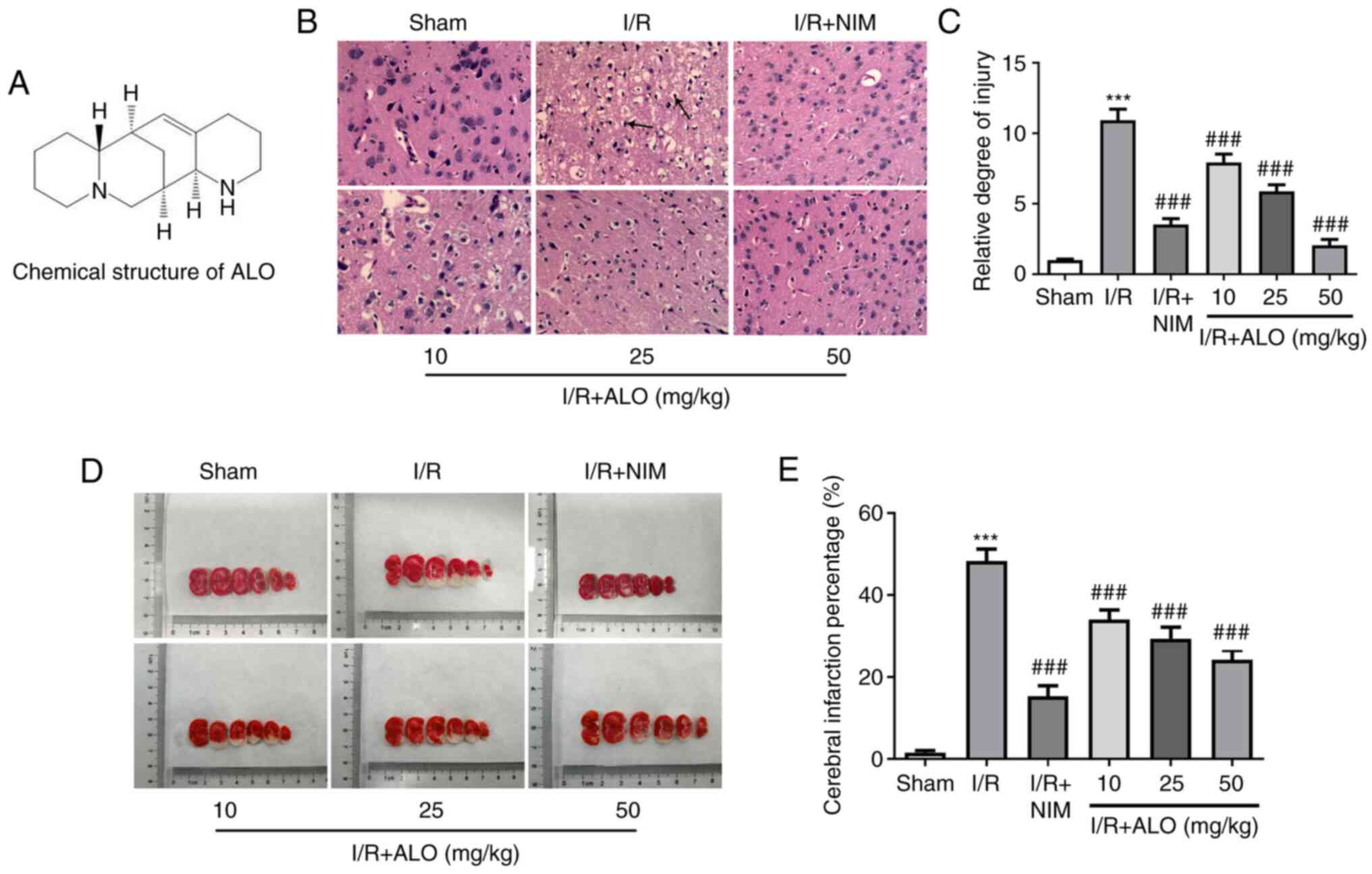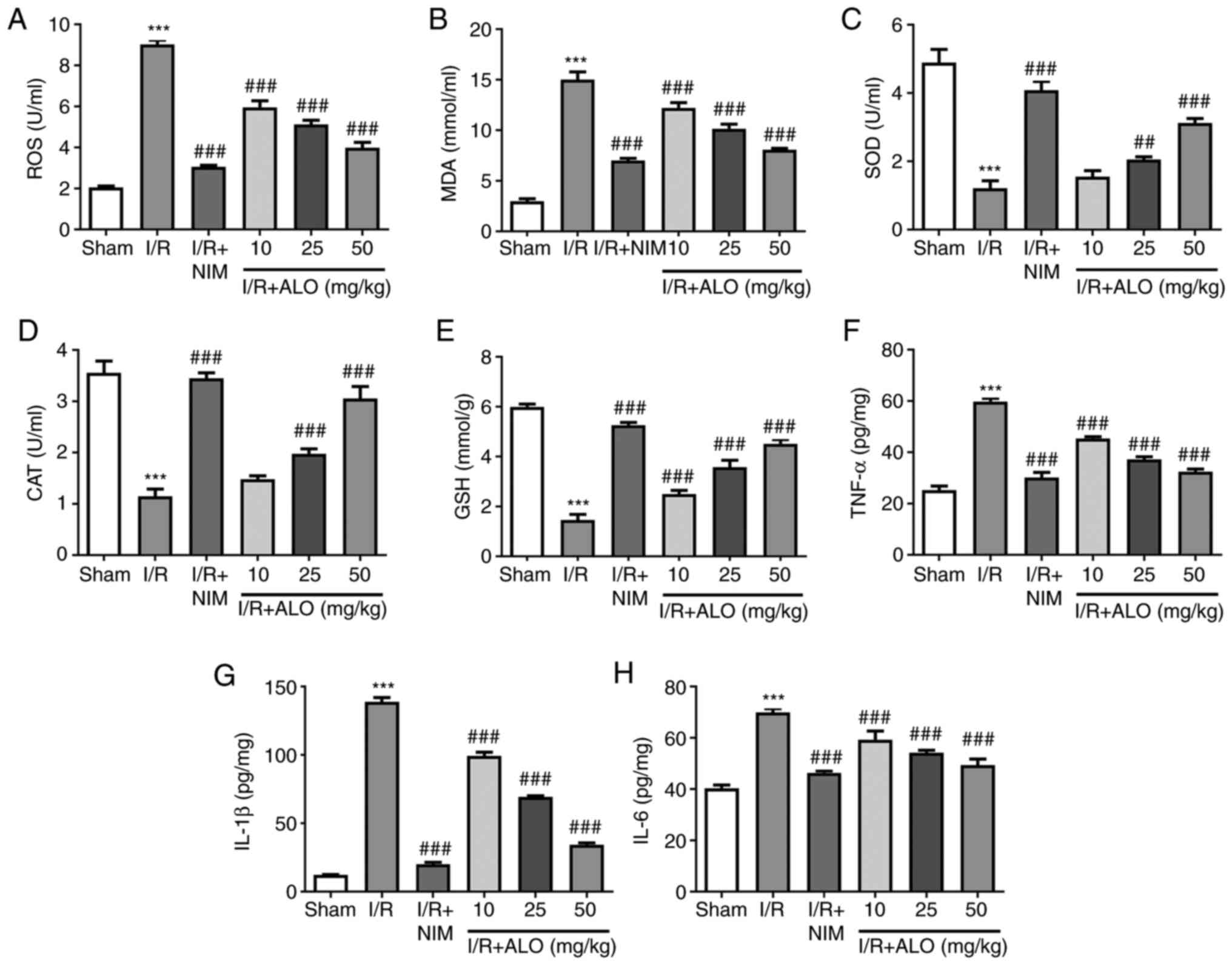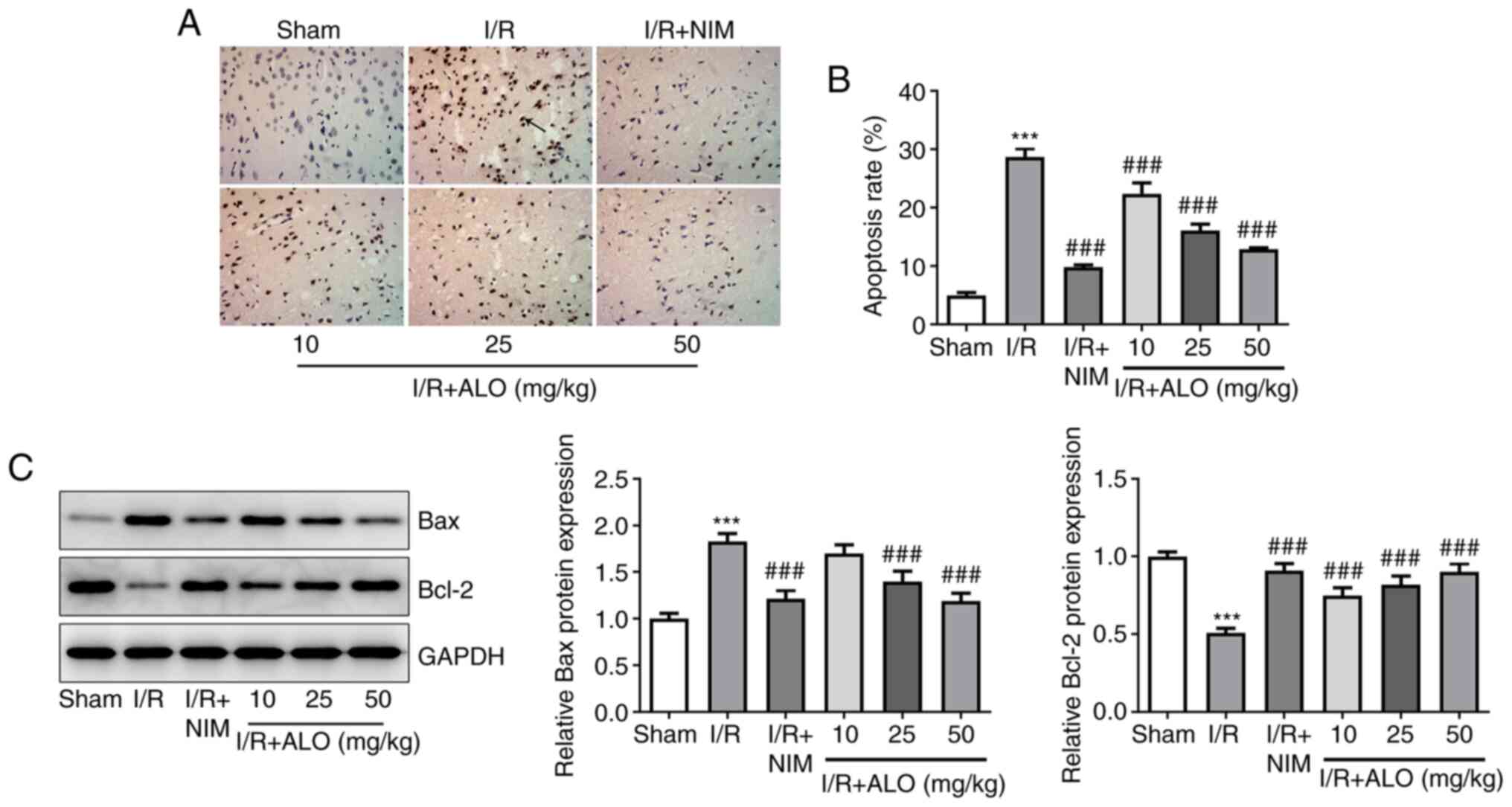|
1
|
Wang Z, Zhou W, Dong H, Ma X and He Z:
Dexmedetomidine pretreatment inhibits cerebral
ischemia/reperfusioninduced neuroinflammation via activation of
AMPK. Mol Med Rep. 18:3957–3964. 2018.PubMed/NCBI View Article : Google Scholar
|
|
2
|
GBD 2017 Causes of Death Collaborators.
Global, regional, and national age-sex-specific mortality for 282
causes of death in 195 countries and territories, 1980-2017: A
systematic analysis for the Global Burden of Disease Study 2017.
Lancet. 392:1736–1788. 2018.PubMed/NCBI View Article : Google Scholar
|
|
3
|
Jung JE, Kim GS, Chen H, Maier CM,
Narasimhan P, Song YS, Niizuma K, Katsu M, Okami N, Yoshioka H, et
al: Reperfusion and neurovascular dysfunction in stroke: From basic
mechanisms to potential strategies for neuroprotection. Mol
Neurobiol. 41:172–179. 2010.PubMed/NCBI View Article : Google Scholar
|
|
4
|
Zhao Y and Xu J: Sanggenon C Ameliorates
cerebral Ischemia-Reperfusion injury by inhibiting inflammation and
oxidative stress through regulating RhoA-ROCK signaling.
Inflammation. 43:1476–1487. 2020.PubMed/NCBI View Article : Google Scholar
|
|
5
|
Esenwa CC and Elkind MS: Inflammatory risk
factors, biomarkers and associated therapy in ischaemic stroke. Nat
Rev Neurol. 12:594–604. 2016.PubMed/NCBI View Article : Google Scholar
|
|
6
|
Yin F, Zhou H, Fang Y, Li C, He Y, Yu L,
Wan H and Yang J: Astragaloside IV alleviates ischemia
reperfusion-induced apoptosis by inhibiting the activation of key
factors in death receptor pathway and mitochondrial pathway. J
Ethnopharmacol. 248(112319)2020.PubMed/NCBI View Article : Google Scholar
|
|
7
|
Brosius AD, Ziller JW and Zhang Q:
Relative and absolute configuration of aloperine. Acta Crystallogr
C. 53 (Pt 10):1510–1512. 1997.PubMed/NCBI View Article : Google Scholar
|
|
8
|
Zhao P, Zhou R, Zhu XY, Hao YJ, Li N, Wang
J, Niu Y, Sun T, Li YX and Yu JQ: Matrine attenuates focal cerebral
ischemic injury by improving antioxidant activity and inhibiting
apoptosis in mice. Int J Mol Med. 36:633–644. 2015.PubMed/NCBI View Article : Google Scholar
|
|
9
|
Zhao J, Zhang G, Li M, Luo Q, Leng Y and
Liu X: Neuro-protective effects of aloperine in an Alzheimer's
disease cellular model. Biomed Pharmacother. 108:137–143.
2018.PubMed/NCBI View Article : Google Scholar
|
|
10
|
Hu S, Zhang Y, Zhang M, Guo Y, Yang P,
Zhang S, Simsekyilmaz S, Xu JF, Li J, Xiang X, et al: Aloperine
protects mice against Ischemia-Reperfusion (IR)-induced renal
injury by regulating PI3K/AKT/mTOR signaling and AP-1 activity. Mol
Med. 21:912–923. 2016.PubMed/NCBI View Article : Google Scholar
|
|
11
|
Ma NT, Zhou R, Chang RY, Hao YJ, Ma L, Jin
SJ, Du J, Zheng J, Zhao CJ, Niu Y, et al: Protective effects of
aloperine on neonatal rat primary cultured hippocampal neurons
injured by oxygen-glucose deprivation and reperfusion. J Nat Med.
69:575–583. 2015.PubMed/NCBI View Article : Google Scholar
|
|
12
|
Song S, Chen Y, Han F, Dong M, Xiang X,
Sui J, Li Y, Yang H and Liu J: Aloperine activates the Nrf2-ARE
pathway when ameliorating early brain injury in a subarachnoid
hemorrhage model. Exp Ther Med. 15:3847–3855. 2018.PubMed/NCBI View Article : Google Scholar
|
|
13
|
Wang M, Chen Z, Yang L and Ding L:
Sappanone A protects against inflammation, oxidative stress and
apoptosis in cerebral Ischemia-Reperfusion injury by alleviating
endoplasmic reticulum stress. Inflammation. 44:934–945.
2021.PubMed/NCBI View Article : Google Scholar
|
|
14
|
Wu F, Yao W, Yang J, Zhang M, Xu Y, Hao Y,
Yan L, Niu Y, Sun T, Yu J and Zhou R: Protective effects of
aloperin on monocroline-induced pulmonary hypertension via
regulation of Rho A/Rho kinsase pathway in rats. Biomed
Pharmacother. 95:1161–1168. 2017.PubMed/NCBI View Article : Google Scholar
|
|
15
|
Song G, Huang Y, Xiong M, Yang Z, Liu Q,
Shen J, Zhao P and Yang X: Aloperine relieves Type 2 diabetes
mellitus via enhancing GLUT4 expression and translocation. Front
Pharmacol. 11(561956)2021.PubMed/NCBI View Article : Google Scholar
|
|
16
|
Bork K, Wurm F, Haller H, Strauss C,
Scheller C, Gnanapragassam VS and Horstkorte R: Neuroprotective and
neuroregenerative effects of nimodipine in a model system of
neuronal differentiation and neurite outgrowth. Molecules.
20:1003–1013. 2015.PubMed/NCBI View Article : Google Scholar
|
|
17
|
Moran JM and Pedrera-Zamorano JD: Comments
on ‘Efficacy and safety assessment of acupuncture and nimodipine to
treat mild cognitive impairment after cerebral infarction: A
randomized controlled trial’. BMC Complement Altern Med.
17(119)2017.PubMed/NCBI View Article : Google Scholar
|
|
18
|
Chen X, Yao Z, Peng X, Wu L, Wu H, Ou Y
and Lai J: Eupafolin alleviates cerebral ischemia/reperfusion
injury in rats via blocking the TLR4/NF-κB signaling pathway. Mol
Med Rep. 22:5135–5144. 2020.PubMed/NCBI View Article : Google Scholar
|
|
19
|
Sanz JM, Chiozzi P, Colaianna M, Zotti M,
Ferrari D, Trabace L, Zuliani G and Di Virgilio F: Nimodipine
inhibits IL-1beta release stimulated by amyloid beta from
microglia. Br J Pharmacol. 167:1702–1711. 2012.PubMed/NCBI View Article : Google Scholar
|
|
20
|
Han K, Rong W, Wang Q, Qu J, Li Q, Bi K
and Liu R: Time-dependent metabolomics study of cerebral
ischemia-reperfusion and its treatment: Focus on the combination of
traditional Chinese medicine and Western medicine. Anal Bioanal
Chem. 412:7195–7209. 2020.PubMed/NCBI View Article : Google Scholar
|
|
21
|
Zou S, Zhang M, Feng L, Zhou Y, Li L and
Ban L: Protective effects of notoginsenoside R1 on cerebral
ischemia-reperfusion injury in rats. Exp Ther Med. 14:6012–6016.
2017.PubMed/NCBI View Article : Google Scholar
|
|
22
|
Trotman-Lucas M, Kelly ME, Janus J and
Gibson CL: Middle cerebral artery occlusion allowing reperfusion
via common carotid artery repair in mice. J Vis Exp.
2019.PubMed/NCBI View
Article : Google Scholar
|
|
23
|
Shi Y, Peng XH, Li X, Luo GP and Wu MF:
Neuroprotective role of dexmedetomidine pretreatment in cerebral
ischemia injury via ADRA2A-mediated phosphorylation of ERK1/2 in
adult rats. Exp Ther Med. 16:5201–5209. 2018.PubMed/NCBI View Article : Google Scholar
|
|
24
|
Hu Q, Chen C, Yan J, Yang X, Shi X, Zhao
J, Lei J, Yang L, Wang K, Chen L, et al: Therapeutic application of
gene silencing MMP-9 in a middle cerebral artery occlusion-induced
focal ischemia rat model. Exp Neurol. 216:35–46. 2009.PubMed/NCBI View Article : Google Scholar
|
|
25
|
Hao MQ, Xie LJ, Leng W and Xue RW: Trim47
is a critical regulator of cerebral ischemia-reperfusion injury
through regulating apoptosis and inflammation. Biochem Biophys Res
Commun. 515:651–657. 2019.PubMed/NCBI View Article : Google Scholar
|
|
26
|
Park SJ, Nam KW, Lee HJ, Cho EY, Koo U and
Mar W: Neuroprotective effects of an alkaloid-free ethyl acetate
extract from the root of Sophora flavescens Ait. against focal
cerebral ischemia in rats. Phytomedicine. 16:1042–1051.
2009.PubMed/NCBI View Article : Google Scholar
|
|
27
|
Zhao P, Zhou R, Li HN, Yao WX, Qiao HQ,
Wang SJ, Niu Y, Sun T, Li YX and Yu JQ: Oxymatrine attenuated
hypoxic-ischemic brain damage in neonatal rats via improving
antioxidant enzyme activities and inhibiting cell death. Neurochem
Int. 89:17–27. 2015.PubMed/NCBI View Article : Google Scholar
|
|
28
|
Peters O, Back T, Lindauer U, Busch C,
Megow D, Dreier J and Dirnagl U: Increased formation of reactive
oxygen species after permanent and reversible middle cerebral
artery occlusion in the rat. J Cereb Blood Flow Metab. 18:196–205.
1998.PubMed/NCBI View Article : Google Scholar
|
|
29
|
Yang Z, Weian C, Susu H and Hanmin W:
Protective effects of mangiferin on cerebral ischemia-reperfusion
injury and its mechanisms. Eur J Pharmacol. 771:145–151.
2016.PubMed/NCBI View Article : Google Scholar
|
|
30
|
Wang Q, Sun AY, Simonyi A, Jensen MD,
Shelat PB, Rottinghaus GE, MacDonald RS, Miller DK, Lubahn DE,
Weisman GA and Sun GY: Neuroprotective mechanisms of curcumin
against cerebral ischemia-induced neuronal apoptosis and behavioral
deficits. J Neurosci Res. 82:138–148. 2005.PubMed/NCBI View Article : Google Scholar
|
|
31
|
Wang TF, Lei Z, Li YX, Wang YS, Wang J,
Wang SJ, Hao YJ, Zhou R, Jin SJ, Du J, et al: Oxysophoridine
protects against focal cerebral ischemic injury by inhibiting
oxidative stress and apoptosis in mice. Neurochem Res.
38:2408–2417. 2013.PubMed/NCBI View Article : Google Scholar
|
|
32
|
Zhang B, Zhong Q and Chen X, Wu X, Sha R,
Song G, Zhang C and Chen X: Neuroprotective effects of celastrol on
transient global cerebral ischemia rats via regulating HMGB1/NF-ĸB
signaling pathway. Front Neurosci. 14(847)2020.PubMed/NCBI View Article : Google Scholar
|
|
33
|
Ahmad A, Khan MM, Raza SS, Javed H,
Ashafaq M and Islam F, Safhi MM and Islam F: Ocimum sanctum
attenuates oxidative damage and neurological deficits following
focal cerebral ischemia/reperfusion injury in rats. Neurol Sci.
33:1239–1247. 2012.PubMed/NCBI View Article : Google Scholar
|
|
34
|
Wei W, Lan XB, Liu N, Yang JM, Du J, Ma L,
Zhang WJ, Niu JG, Sun T and Yu JQ: Echinacoside alleviates
hypoxic-ischemic brain injury in neonatal rat by enhancing
antioxidant capacity and inhibiting apoptosis. Neurochem Res.
44:1582–1592. 2019.PubMed/NCBI View Article : Google Scholar
|
|
35
|
Wu F, Hao Y, Yang J, Yao W, Xu Y, Yan L,
Niu Y, Sun T, Yu J and Zhou R: Protective effects of aloperine on
monocrotaline-induced pulmonary hypertension in rats. Biomed
Pharmacother. 89:632–641. 2017.PubMed/NCBI View Article : Google Scholar
|
|
36
|
Zhang J, Zhou H, Chen J, Lv X and Liu H:
Aloperine protects human retinal pigment epithelial cells against
hydrogen peroxide-induced oxidative stress and apoptosis through
activation of Nrf2/HO-1 pathway. J Recept Signal Transduct Res: Nov
30, 2020 (Epub ahead of print).
|
|
37
|
Han B, Lu Y, Zhao H, Wang Y, Li L and Wang
T: Electroacupuncture modulated the inflammatory reaction in MCAO
rats via inhibiting the TLR4/NF-κB signaling pathway in microglia.
Int J Clin Exp Pathol. 8:11199–11205. 2015.PubMed/NCBI
|
|
38
|
Hou SZ, Li Y, Zhu XL, Wang ZY, Wang X and
Xu Y: Ameliorative effects of diammonium glycyrrhizinate on
inflammation in focal cerebral ischemic-reperfusion injury. Brain
Res. 1447:20–27. 2012.PubMed/NCBI View Article : Google Scholar
|
|
39
|
Shichita T, Sakaguchi R, Suzuki M and
Yoshimura A: Post-ischemic inflammation in the brain. Front
Immunol. 3(132)2012.PubMed/NCBI View Article : Google Scholar
|
|
40
|
Liu Q and Zhang Y: PRDX1 enhances cerebral
ischemia-reperfusion injury through activation of TLR4-regulated
inflammation and apoptosis. Biochem Biophys Res Commun.
519:453–461. 2019.PubMed/NCBI View Article : Google Scholar
|
|
41
|
Kao TK, Ou YC, Liao SL, Chen WY, Wang CC,
Chen SY, Chiang AN and Chen CJ: Opioids modulate post-ischemic
progression in a rat model of stroke. Neurochem Int. 52:1256–1265.
2008.PubMed/NCBI View Article : Google Scholar
|
|
42
|
Zhao J, Li L and Fang G: Salvianolic acid
A attenuates cerebral ischemia/reperfusion injury induced rat brain
damage, inflammation and apoptosis by regulating miR-499a/DDK1. Am
J Transl Res. 12:3288–3301. 2020.PubMed/NCBI
|
|
43
|
Chang Z, Zhang P, Zhang M, Jun F, Hu Z,
Yang J, Wu Y and Zhou R: Aloperine suppresses human pulmonary
vascular smooth muscle cell proliferation via inhibiting
inflammatory response. Chin J Physiol. 62:157–165. 2019.PubMed/NCBI View Article : Google Scholar
|
|
44
|
Mao Q, Guo F, Liang X, Wu Y and Lu Y:
Aloperine activates the PI3K/Akt Pathway and protects against
coronary microembolisation-induced myocardial injury in rats.
Pharmacology. 104:90–97. 2019.PubMed/NCBI View Article : Google Scholar
|
|
45
|
Cantley LC: The phosphoinositide 3-kinase
pathway. Science. 296:1655–1657. 2002.PubMed/NCBI View Article : Google Scholar
|
|
46
|
Feng C, Wan H, Zhang Y, Yu L, Shao C, He
Y, Wan H and Jin W: Neuroprotective effect of Danhong injection on
cerebral Ischemia-Reperfusion injury in rats by activation of the
PI3K-Akt pathway. Front Pharmacol. 11(298)2020.PubMed/NCBI View Article : Google Scholar
|
|
47
|
Yu Y, Jia XJ, Zong QF, Zhang GJ, Ye HW, Hu
J, Gao Q and Guan SD: Remote ischemic postconditioning protects the
heart by upregulating ALDH2 expression levels through the PI3K/Akt
signaling pathway. Mol Med Rep. 10:536–542. 2014.PubMed/NCBI View Article : Google Scholar
|
|
48
|
Wang Z, Han Y, Tian S, Bao J, Wang Y and
Jiao J: Lupeol alleviates cerebral Ischemia-Reperfusion injury in
correlation with modulation of PI3K/Akt pathway. Neuropsychiatr Dis
Treat. 16:1381–1390. 2020.PubMed/NCBI View Article : Google Scholar
|
|
49
|
Pignataro G, Meller R, Inoue K, Ordonez
AN, Ashley MD, Xiong Z, Gala R and Simon RP: In vivo and in vitro
characterization of a novel neuroprotective strategy for stroke:
Ischemic postconditioning. J Cereb Blood Flow Metab. 28:232–241.
2008.PubMed/NCBI View Article : Google Scholar
|
|
50
|
Fu X, Sun F, Wang F, Zhang J, Zheng B,
Zhong J, Yue T, Zheng X, Xu JF and Wang CY: Aloperine protects mice
against DSS-induced colitis by PP2A-mediated PI3K/Akt/mTOR
signaling suppression. Mediators Inflamm.
2017(5706152)2017.PubMed/NCBI View Article : Google Scholar
|


















